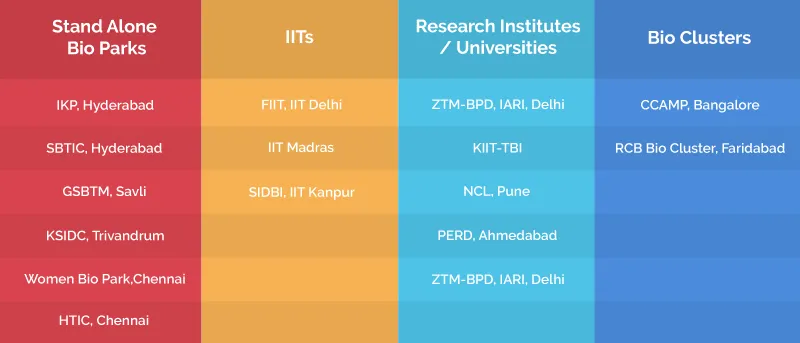A list of incubators to help, support and strengthen your startup
Entrepreneurship is not an easy road and the more you grow the more challenges you face. From awareness and sustainability of businesses to regulations associated with legality and enforceability, the list of challenges is long.
Given these challenges, it can be hard to get started on your entrepreneurial journey without guidance and assistance. So how does one move forward and get ahead? Where do entrepreneurs get their dose of skill and know-how supplements to turn their startup ideas into reality? Incubators have an answer to the problem.
Whether you are just getting started or are looking to startup, incubators can serve as a great platform to give you that much-needed support and push to build a solid foundation. Many people confuse incubators and accelerators. However, the difference lies in the name. Similar to an incubation chamber, incubators help the seeds of startup ideas germinate and evolve into the beginnings of future organisations. On the other hand, accelerators “accelerate” already nascent startups into maturity. Incubators tend to be slightly long-term associations while startup founders find their calling, while accelerators focus on fast growth in a relatively short time.
The Government of India’s ‘Startup India’ scheme has the India Aspiration Fund which has the right to disburse Rs 2,500 crores per year, with a total corpus of Rs 10,000 crores across four years. This is the capital pile organically available for startups as dispensed under the management of various academic institutions. The incubators set up at these institutions have become playschools/nurseries to nurture India’s next generation of unicorns.
Here are the major government initiatives that are driving this wave of incubation:

Image: Pixabay
National Science & Technology Entrepreneurship Development Board (NSTEDB)
Set up under the auspices of the Department of Science and Technology, the NSTEDB is an institutional mechanism that drives innovation and technology through intensive programmes and expertise.The various branches it extends support to include:
Technology Business Incubators (TBIs): TBIs are instruments that provide incubation to help usher the wider proliferation of innovative tech-driven enterprises. They are recognised and funded by the DST (Department of Science and Technology) and MHRD (Ministry of Human Resources and Development).
With their accumulated knowledge in the fields of business and technology, TBIs are geared to increase the survival rate of various startups at the early stage. They give startups the real feel of the various aspects of conducting a business, with assistance in business development marketing, financial models, legal aspects and intellectual property rights, and technical and administrative services, apart from offering a wide variety of office facilities (office space, internet access, infrastructure, etc.).
The following institutes host TBIs across India: IIT Mandi, NIT Warangal, MANIT Bhopal, NIT Rourkela, MNIT Jaipur, IIM Rohtak, NIT Calicut, IIT Roorkee, IIT Ropar, IISER Bhopal, IIM Kozhikode, NIT Jalandhar, IIM Udaipur, IISER Mohali, IIT Patna, IISER Thiruvananthapuram, IIM Raipur, NIT Tiruchirappalli, and BITS Pilani.
National Initiative for Developing and Harnessing Innovation (NIDHI): NIDHI is an umbrella programme devised and compiled by the Innovation & Entrepreneurship Division, Department of Science & Technology, Government of India, for garnering ideas and innovations that focus on knowledge-based and technology-driven startups.
NewGen Innovation and Entrepreneurship Development Centre (NewGen IEDC): NewGen IEDCs are incubation centres coordinated by the Entrepreneurship Development Institute of India (EDI), Ahmedabad. They provide financial support of Rs 25 lakhs and are centres that promote and encourage techno-entrepreneurship. Their main purpose is to promote the growth of innovation and generate wealth and employment through entrepreneurship.
Science & Technology Entrepreneurship Development (STED) Project: The STED Project aims to enhance socio-economic development in industrially backward regions. It enables access to opportunities and helps startups become technically and economically feasible. The total life of the project is four years, through which local entrepreneurs work on modernisation and technology ideas. The project aims to develop 200 micro-models across India. Some of the places where STED is running include Karaikudi, Kozhikode, Agartala, Moradabad, Pithoragarh, and Hazaribagh.
innovation – Science and Technology-based Entrepreneurship Development (i-STED): i-STED identifies challenges and builds solutions in and around technology-centred approaches. The programme identifies and implements inclusive socio-economic development by addressing the challenges faced in industry-specific zones, and encourages solutions through disruptive science and technology innovation. Common target challenge areas include energy, water, affordable health, affordable housing, waste management, and any specific industry sector/cluster. The solutions add up to the overall development of economic gains and wealth generation.
The following institutions are instrumental in implementing i-STED in various regions of India:
Science & Technology Entrepreneurs Park (STEP): These parks create an atmosphere where the main idea is to help “job seekers to become job creators”. STEPs form a collaboration between academic institutions and select industries through idea sharing, experience, knowledge, facilities, and rapid transfer of tech. Currently, STEPs have been set up at the following institutions:
Startup centres: These are incubation centres that have been set up in association with the institutes listed below. They foster startups within a student-driven environment, providing a funding of Rs 50 lakhs per year for three years.
Atal Innovation Mission (AIM)
An initiative launched by NITI Aayog, the Atal Innovation Mission has set up Atal Incubation Centres (AICs) across the country that are going to facilitate around 500 labs, providing a grant of Rs 10 crores for a period of five years. AIM’s Self-Employment and Talent Utilization (SETU) programme is part of the Government of India’s prime undertaking to promote a culture that envelops innovation and entrepreneurship. Its objective is to serve as a platform for the promotion of world-class innovation hubs, grand challenges, start-up businesses, and other self-employment activities, particularly in technology-driven areas.
The Atal Innovation Mission has two core functions: entrepreneurship promotion through self-employment and talent utilization, wherein innovators are supported and mentored to become successful entrepreneurs; and innovation promotion, to provide a platform where innovative ideas are generated.
AICs can be established either in public/private/public-private partnership mode. These can be established in academia (this includes higher educational institutes and R&D institutions), as well as non-academic setups (this includes companies/corporates/technology parks/industrial parks and/or any individual/group of individuals).
AIM also provides scale-up support of Rs 10 crore over a period of two years to established incubation centres. In 2017, NITI Aayog selected five additional incubators to be funded under this mission – the bio-incubator at C-CAMP, NIT TREC STEP, Amrita TBI, NSRCEL, IIM Bangalore, and 91springboard.
Biotechnology Industry Research Assistance Council (BIRAC)
BIRAC is the agency that promotes and empowers various biotech companies to venture into research and innovation under its multiple schemes. Companies boosted by BIRAC have strengthened some existing incubation facilities at certain geographic locations in the country. The “think tank” of the Government, Niti Aayog, has recommended district incubation centres (in a PPP mode) under the SETU scheme that could reach out to startups. These will be broken up into the following types:

Research Parks: Under BIRAC, various research parks also promote R&D into various advances in the biotechnology sector, with Rs 100 crores set aside for each park. These parks exist at IIT Guwahati, IIT Hyderabad, IIT Delhi, IIT Kanpur, IIT Kharagpur, IISc Bangalore, and IIT Gandhinagar.
Ministry of Electronics and Information Technology (MeitY)
Through the Ministry of Electronics and Information Technology’s Technology Incubation and Development of Entrepreneurs (TIDE) scheme, startups that function in the technology domain can avail incubation assistance. The total grant-in-aid on offer is Rs 155 lakhs, where Rs 125 lakhs is used to support the incubation and the rest is for development of infrastructure. TIDE centres have also become hotspots for VCs and investors who provide extensive networking and growth opportunities. The TIDE centres are listed below:
- Society for Innovation and Entrepreneurship (SINE), IIT Bombay
- Amrita Technology Business Incubator (Amrita-TBI), Bengaluru
- Technology Innovation and Incubation Centre (TIIC), Atal Bihari Vajpayee Indian Institute of Information Technology & Management (ABV-IIITM), Gwalior
- Foundation for Innovation and Technology Transfer(FITT), IIT Delhi
- Entrepreneurship Development Cell (EDC), Banasthali Vidyapith
- IITGN Incubation Centre (IIC), IIT Gandhinagar
- Technology Business Incubator, BITS Pilani
- IITG-Technology Incubation Centre (IITG-TIC), IIT Guwahati
- Society for Technology Incubation & Development of Entrepreneurs (STIDE), Central University of Rajasthan
- SIDBI Innovation and Incubation Center (SIIC), IIT Kanpur
- DA-IICT Centre for Entrepreneurship and Incubation (DCEI), DA-IICT
- Science Technology Entrepreneurship Park (STEP), IIT Kharagpur
- IIITA Info Communication Incubation Centre (IIIC), IIIT Allahabad
- Rural Technology and Business Incubator(RTBI), IIT Madras
- IIITB Innovation Center, IIIT Bangalore
- Center for Innovation and Business Incubation (CIBI), IIT Ropar
- Centre for Innovation & Entrepreneurship (CIE), IIIT Hyderabad
- KIIT Technology Business Incubator (KIIT-TBI), KIIT, Bhubaneswar
- Centre for Innovation Incubation and Entrepreneurship (CIIE), IIM Ahmedabad
- Technology Business Incubator- NITC (TBI-NITC), NIT Calicut
- Nadathur S Raghavan Centre for Entrepreneurial Learning (NSRCEL), IIM Bangalore
- NITK- Science Technology Entrepreneurship Park (NITK-STEP), NITK Surathkal
- ROLTA Innovation and Incubation Centre, MANIT Bhopal
- Society for Innovation & Development (SID), IISc Bangalore
- Technology Incubation and Development of Entrepreneurship (TIDE-UoH), University of Hyderabad
- IIT Roorkee
Ministry of Micro, Small & Medium Enterprises (MSME)
The MSME provides a seed capital fund of Rs 1 crore per incubator. It provides Rs 30 lakhs for incubators to existing TBIs and Rs 100 lakhs to institutions looking to set up new TBIs. The list of incubators approved by the MSME includes some 207 host institutions.
State governments
Startup Yatra is a state-level entrepreneurship programme launched by the DIPP (Department of Industrial Policy and Promotion) that operates on a hub-and-spoke model. 14 states have become a part of this programme so far – Andhra Pradesh, Goa, Kerala, Rajasthan, Bihar, Karnataka, Maharashtra, Madhya Pradesh, Telangana, Gujarat, Uttar Pradesh, Haryana, Assam, and West Bengal.
Thus, incubators can become key to the growth of startups in the country, offering expertise and help otherwise perhaps not easily available. In addition to government funding, many of these incubators and schemes also benefit from CSR programmes and tie-ups with corporate entities.
India is primed to create socio-economic impact across business systems around the world in the near future. Startups form the core of this movement and need incubators that are set up with a motive to make them into scalable and profitable enterprises. Aggregating this pool of talent from young entrepreneurs in colleges and universities can be an important tool to harness growth and progress. With the assistance of incubators, startups are becoming machines of rapid and tremendous growth that provide solution mechanisms. They are manifesting advances with widespread technological innovation at a breakneck pace.
With the active participation and contribution of the Government of India, the country’s entrepreneurial collective can expect to receive the incubation and support it needs to truly transform the future of the country’s economy.
Watch this space for more information about incubators in the corporate space.







